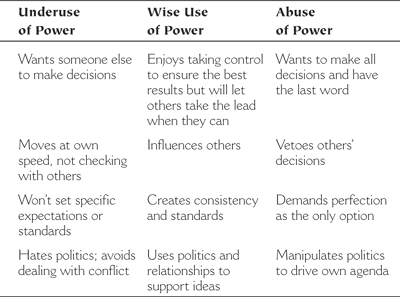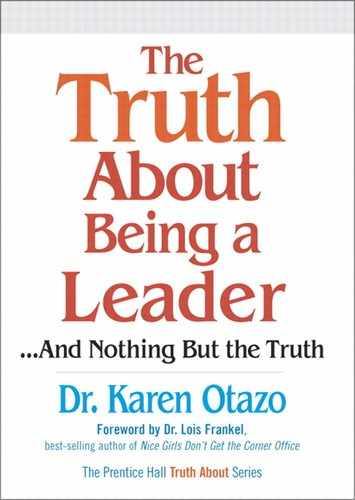Truth 26
Good Leadership Is The Wise Use of Power
Niccolo Machiavelli is infamous for writing "Power corrupts, and absolute power corrupts absolutely." His observations of the 16th-century Italian Medici court helped him truly understand how often power is misused. Yet he also believed that, with the wise use of power, leaders can generate great visions that stir the souls of others.
You cannot ignore the issue of power as a leader. On a basic level, you simply have it, because you get to make decisions and influence outcomes for others. That is not inherently a good or bad thing, just a fact. The real issue is how you put that power to use. People often think of power in negative terms because it is easy to abuse. Being in charge certainly requires you to take control. The key, however, is to do so with benign or positive intent toward your followers, rather than narcissistic self-interest.
Some people love the idea of power and jump to take charge. Others are more reluctant to flex their muscles. What we all have in common is the duty to learn to use power wisely, balancing any natural tendencies to overuse it or underuse it. Used to maximum effect, your leadership power will empower your organization and its employees. Used carelessly, it will disempower them by making them wait for you to make decisions or by creating fear of disapproval.
You'll know how you are using the power available to you by observing your own behavior and getting feedback from others. Use the following chart to help you think about this. Ask yourself which column you fall into for each issue. Be honest! Then ask yourself if that is who you want to be as a leader. If you don't like what you see on the chart, start thinking about what you need to do to change. That self-awareness is the first step to becoming a wise leader.

People who underuse their power tend to want someone else to make decisions, they move at their own measured or slow speed without consulting others, and they hate to "play politics." In relation to their followers, they may be reluctant to set expectations and deadlines, give tough feedback, or move people out when they're not right for a role.
Although you may
have basic power
automatically
through your title,
true power can only
be bestowed on you
by the people you
lead.
Abuse of power occurs when a leader demands constant recognition, perfection, and work done his or her way. Abuse gets even easier to recognize when leaders use power to demand special perks for themselves.
For the wise and moderate use of power, you need to set high but reachable goals and enjoy being in charge and influencing others. It's even better when you use your power to set broad organizational goals that you then translate into specific actions. It's also useful to put in place some consistency and standards that help you sort out organizational politics, since that will lead to fewer special favors.
The good of the organization should always be at the heart of what you do. For some people, this means speaking up and pushing people in a way that goes against their nature. For others, it means subduing their natural urge to just take charge and pull others in their wake. Finding the right balance ensures that employees feel secure and cared for as they rise to the challenges of organizational life.
Although you may have basic power automatically through your title, true power can only be bestowed on you by the people you lead. Real power comes from your staff believing in your expertise and trusting you as a leader while knowing that you have the clout to get things done on their behalf. This makes them want to follow you. In a virtuous circle, the more people want to follow you, the more power you have.
No matter what kind of organization you lead, it's how you use power that distinguishes your leadership tenure.
